North Wales' key role in helicopter pilot training
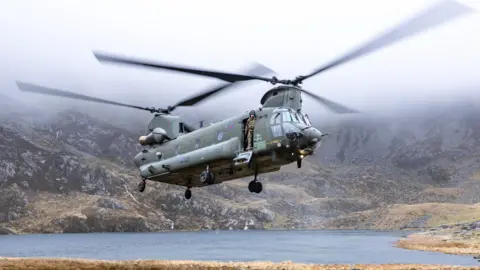 MOD/RAF VALLEY
MOD/RAF VALLEY- RAF Operation Kukri Dawn has been taking place across parts of Wales
- It is the final training operation for new Chinook pilots and crew
- RAF Valley on Anglesey has been the base
- Crews will graduate after the exercise - to be deployed anywhere in the world
Huge low flying military helicopters have been spotted in north and mid Wales over the past week.
One enormous twin-rotor aircraft was even seen making an emergency landing in a field in Gwynedd - where it will have to be pulled out by a crane.
But why have giant RAF Chinook helicopters been seen in the skies?
It has been part of Operation Kukri Dawn, the final test for trainees who have spent the past three years learning how to fly what is the air force's aerial workhorse.
After spending a fortnight based at RAF Valley on Anglesey, the new pilots will now graduate - ready for action.
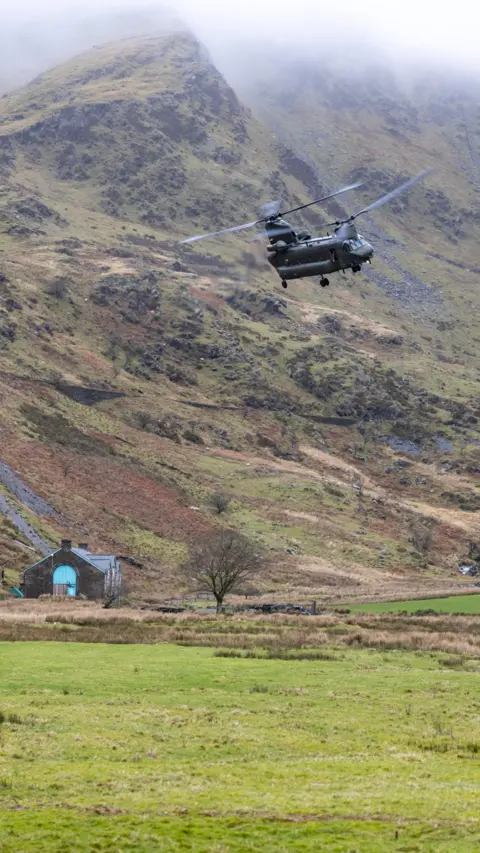 MOD/RAF VALLEY
MOD/RAF VALLEY"They'll be - as of next week - ready to be deployed worldwide in support of war fighting or humanitarian missions," said Wing Cdr Hannah Bishop, the woman in charge of the RAF's 28 Squadron, which is responsible for training crews on its support helicopter fleet.
The two weeks in north Wales is the "capstone" operation, to make sure the crews are up to those tasks.
"We like to test them somewhere unusual, in unusual environments, and RAF Valley in particular provides us with excellent training," said the air chief.
"North Wales, of course with the mountains, provides a superb environment for us to really, really test our pilots and learn a range of skills they will use worldwide."
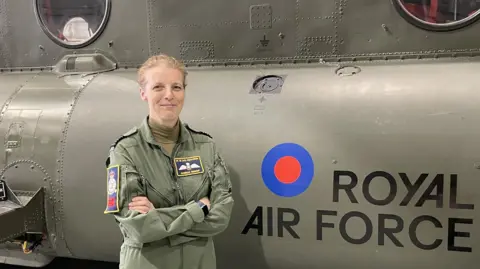
The two weeks have thrown everything at the trainees - especially the weather, with the mountains of Eryri - also known as Snowdonia - shrouded in cloud and heavy rain for much of the time.
The air crews have been joined on the operations by soldiers from 1 Rifles, based just outside Chepstow, Monmouthshire, and north Wales mountain rescue teams.
For one of the crews rescue became part of the operation for real, after having to bring one of the Chinooks down in a "precautionary forced landing" just outside Fairbourne in Gwynedd.
"We're very grateful to the landowner and the local residents for their continuing patience with what is now a recovery exercise," explained Wing Cdr Bishop.
What is the Chinook's role?
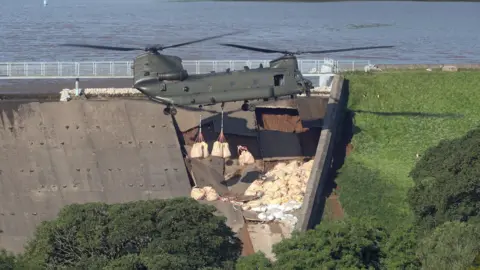 PA Media
PA Media- The Chinook is the RAF's large support helicopter
- It can carry 55 soldiers to deploy where they are needed
- It can also be used to refuel other aircraft in flight
- The Chinook can carry loads in excess of 10 tonnes
- During the Covid pandemic, the helicopters transported key medical staff around the UK
- After storms in 2019, military chiefs called in Chinooks to help dam a breached reservoir in Derbyshire
RAF engineers said the helicopter had suffered a fault with a hydraulic line, which has already been repaired. However, the undercarriage of the Chinook has sunk into mud in the field, and now it must be lifted out.
"It's not routine, but I'd also say it's not unusual. All our crews are trained to land in fields, as a helicopter we don't need to land on a runway, so if we have a small technical problem then often we'll just land in a precautionary way into the field to deal with it safely on the ground," said Wing Cdr Bishop.
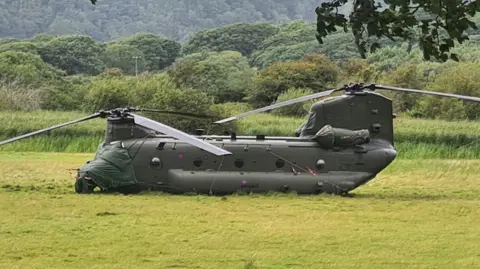 Richard Lewis
Richard LewisBut it did mean the wing commander was called on to fly in a replacement Chinook from 28 Squadron's base at RAF Benson in Oxfordshire, to ensure the training could continue.
"For me it's the best job in the world," she said.
"I get to fly these all around the world in support of various missions, war fighting, humanitarian missions. It's something I've been doing for over 20 years and I really enjoy it. It's very rare that the UK will commit to an operation without the Chinook."
